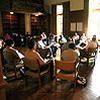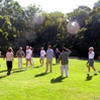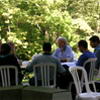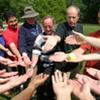PROGRAM
Pattern Languages of Programs (PLoPTM) conference is the premier event for pattern authors and pattern enthusiasts to gather, discuss and learn more about patterns and software development.
The conference program is being completed, and this page will be updated as more details are known.
- conference at a glance;
- keynotes;
- focus groups & workshops;
- games;
- accepted papers: for Writers' Workshops, and for the Writing Group;
Conference at a Glance
The BootCamp, a special full-day Pre-PLoP activity for newcomers, will happen during Sunday, 23 October from 8:30 - 18:00. The PLoP conference starts on Sunday evening, 23 October at 18:00, with the traditional games and pizza dinner and it will conclude on Wednesday evening, 26 October at 18:00.
PLoP and the Bootcamp will be held at Allerton Park, Monticello, Illinois, USA.
Keynotes
| "Patterns for Creative Thinking" |
|
Can patterns help you to be a more creative person? Christian believes that the answer is YES. In his talk he will explore the relationship between patterns and creative thinking. First of all he will show how patterns in general can stimulate creative and generative thought processes. Then he will identify common patterns of creative thinking. These patterns are based on hundreds of known ways to get and implement new ideas. Patterns allow a deeper reflection about how, why and when specific methods foster creativity. Moreover, a pattern language captures the interplay and dependencies of creative thinking processes. After a short exploration of the pattern mining approach, the presentation will focus on how to use the patterns. The generative nature of patterns allows you do adapt them to your own individual context. Become a more creative person by changing habits, setting up an inspiring environment, installing required tools and following a holistic process of creative thinking. Christian Kohls, PhD, is a professor of Computer Science and Sociotechnical Systems at the TH Köln, a university of technology, arts, and sciences, based in Cologne, Germany. He teaches several courses on design patterns, including software design patterns, sociotechnical patterns, and e-learning patterns. He also uses patterns to stimulate innovation in student projects. Currently he is installing an innovation and collaboration room that supports creative thinking by design. He has written and edited many papers and two books on e-learning patterns. His research on patterns is both practical and theoretical. In his PhD he developed a model that shows the relation between patterns in the world, our mental schemas and scientific theories. He applies the pattern approach as a general research method in numerous projects. Being a regular PLoP participant he never misses a game session – for the fun, inspiration and community building. |
| "Microservices, Patterns, and the evolution of Services Architecture" |
|
In this talk Kyle will discuss how microservices, which many have called the "next big thing" in services architectures, came about, what teams are accomplishing using the architecture, and what pitfalls they're encountering. Along the way he'll discuss how a specific set of software patterns, published in a number of different places, became critical parts of the "de facto" microservices architecture. Kyle Brown is an IBM Distinguished Engineer and the CTO of Cloud Architecture for IBM Cloud Architecture and Solution Engineering. He is a veteran of the software industry with well over 25 years of experience, and a "fixture" at PLoP, being a past PLoP chair (2002), Program Committee member and frequent patterns workshop contributor. He's the author or co-author of well over one hundred articles and seven books on Software Engineering, including "The Design Patterns Smalltalk Companion", "Enterprise Integration Patterns" and most recently "Modern Web Development with IBM WebSphere". |
Focus Groups & Workshops
| "Creating Future Vision of the Creative Society Where Pattern Languages are Used" [Focus Group 1] |
|
Norihiko Kimura, Yuma Akado, Ayaka Yoshikawa, Takashi Iba, Monday, 24 October, 16:00 - 17:30 |
|
In this focus group, we will hold a Future Language Workshop to discuss a future vision of a creative society where pattern languages are used. Throughout this workshop, participants will discuss the ideal future about a pattern language and describe the vision as Future Words. Then, we will hold dialogue sessions and have participants write their visions as short stories. |
| "A Pattern Language for Handovers" [Focus Group 2] |
|
Kei Ito, Hironori Washizaki, Joseph W. Yoder, Tuesday, 25 October, 16:00 - 17:30 |
|
A handover is a process of transforming responsibilities and knowledge from the predecessor to the successor [AM10a] [AM10b]. Handover is a necessary activity for saving superior knowledge and skills to the organizations. Most business people are familiar with the concept of a handover. Although effective handovers are crucial for seamless business operations during personnel changes, the preferable elements for a handover are ambiguous and not well understood. This motivated us to examine this topic. We held a workshop on handover to assess actual problems due to undesirable handovers. The results were used to elucidate three handover anti-patterns (unsupported to review, background is unclear, and necessary knowledge is omitted), which identified concrete problems of handovers [KHY16]. By analyzing the anti-patterns, their origins became clear. We noted that one of the main causes of an undesirable handover is the failure of a predecessor to communicate clearly with his or her successor. From this analysis, we noted 25 handover solution patterns. Handover anti-patterns and handover solution patterns are related to each other. To better understand handover issues, it is useful to understand both handover anti-patterns and handover solution patterns. The goals of this workshop are finding the relations of the handover solution patterns, specifying the priority of the patterns, finding possible new patterns, and sharing the experiences of handovers. In this focus group, we are planning to discuss the relationship between the 25 patterns, and priority of the patterns. We will divide participants into some groups and let them brainstorm how the 25 patterns relate, and their priorities. Participants are expected to discuss the relationship between each pattern, and the experiences of their handovers. Based on the group discussion, the participants make their own pattern map by each group. Finally, we are planning to share the pattern maps and discuss some issues. This might lead us to finding gaps in our proposed patterns or seeing how the proposed patterns fit into the pattern language. Moreover, we would seek for new patterns. We encourage active discussions related to handovers for participants. This focus group is intended for anyone involved in a handover process. Improper handovers evoke the loss of superior knowledge and skills. This is a common phenomenon in business. Participants of this focus group gain a hint to avoid this issue by sharing their experiences and opinions with other participants. |
| "Pattern-Driven Idea Generation: Inventing New Supporting Systems for People with Dementia" [Focus Group 3] |
|
Ayaka Yoshikawa, Tomoki Kaneko, Yuma Akado, Haruka Mori, Takashi Iba, Wednesday, 26 October, 9:00 - 10:30 |
|
In this focus group, you will participate in a collaborative discussion and generate new ideas of support systems for people with dementia. Dementia is a syndrome of deterioration of memory, thinking, behavior, and the ability to perform daily life activities, and is a growing social issue. The number of people with dementia is rapidly increasing; over 8 million in Japan (one in four people over the age of 65) and more than 800,000 people in UK (one in 14 people over the age of 65). Despite this critical social issue, there have not been enough efforts to design systems, tools, and services that allow people with dementia to live well in daily life. With this background, we will together generate ideas about new support systems, tools, and services toward a dementia-friendly society. Note that no prior knowledge is necessary. During the workshop, we will use the cards of “Words for a Journey,” a pattern language for living well with dementia (Iba and Okada, 2015; Iba, et al, 2015; Iba, et al, 2016), so you can learn about the problems people with dementia face, during the workshop. This pattern language consists of 40 patterns for living well with dementia, and divided into three categories: ‘Words for those Living with Dementia,’ ‘Words for Caring Families’ and ‘Words for Everyone.’ The patterns in each category provide solutions to the problems that people in the corresponding category face in their lives. In addition, we will also use the Project Design Patterns (Kubota et al, 2016), to turn the ideas we brainstorm into great projects. Thus, we will be using two types of pattern languages in this workshop for social innovation. |
| "Patterns that connect: Exploring the Potential of Patterns and Pattern Languages in the Context of Complex Systems and Systemic Change." [Focus Group 4] |
|
Helene Finidori, Wednesday, 26 October, 13:00 - 14:30 |
|
Working across disciplines and domains towards more sustainable socio-technological and socio-environmental systems, and thereby better addressing wicked problems, is a critical endeavor of the 21st century which requires collaborative efforts and the broad development of systemic literacy. Systems scientists have endeavored to recognize patterns in systems behaviors. How can pattern languages help achieve this and orient the dynamics of systems in more systematic and easily accessible ways? The semiotic attributes of the pattern, at the same time a phenomenological object, its representation(s) and its interpretation(s) could be more systematically investigated and operationalized to enable the decoding (i.e. recognizing and interpretation) and encoding (modeling and prototyping) of complex phenomena and multidimensional dynamics in transdisciplinary / multistakeholder contexts. The ubiquity and versatility of patterns make them great candidates for connecting different levels of analysis and dynamics of various nature and pace, and for using experimental design and hermeneutical interpretation approaches across boundaries. Related papers:
In this workshop we will explore the unfulfilled potential of patterns and pattern languages as tools for sense-making, systemic (re)configuring and mediation across domains of knowledge and activity, to support purpose-seeking/context-adaptive modeling, design and evaluation in complex systems. |
Games
| Games | |
|
The PLoP Games Master is Christian Kohls (see schedule) |
|
|
Christian Kohls, PhD, and a professor for computer science and socio-technical systems at Germany’s largest university of applied sciences, the TH Köln. Patterns are a big part of his life – including software patterns, educational patterns, and patterns for creative thinking. Being a regular PLoP participant he never misses a game session – for the fun, inspiration and community building. |
|
Accepted Papers
All accepted papers are organized into Writer's Workshops by categorizing the contents and trying to build groups with a balanced workload (number of papers) and with matching contents.
| Writing Group | |
|
"Effectiveness of Learning 8 Languages Using Patterns" |
|
|
"Pattern language for IoT applications" |
|
|
"Engenic Inheritance: a design pattern" |
|
|
"Cross Border Leadership Patterns: A Pattern Language for Social Intrapreneurs at the Early Stages" |
|








